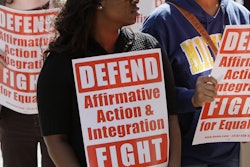The most ardent argument made against affirmative action is that it
allows less qualified African American and Hispanic students to take
seats away from more qualified White students.
In an attempt to find out if that is true, the Frederick T.
Patterson Research Institute of The College Fund/UNCF studied the
relevant records. The answer it came up with: maybe sometimes, but not
often.
Certainly in the most aggregate sense it is not true, according to
the study. The institutions that practice the most affirmative action
— as a whole — expanded their freshman classes by about as much as
the increased number of incoming African American and Hispanic students.
And the African American and Hispanic students who attend those
schools have the same credentials — again, for the most part — as the
White students. It did find, however, that qualified African American
and Hispanic students are much more likely to be admitted to top
selective institutes than their White counterparts — as much as
two-and-a-half times as likely. With those findings, the Patterson
Institute — the research arm of The College Fund/UNCF (formerly the
United Negro College Fund) — is attempting to weigh in on one of the
most contentious issues of public policy today with a careful analysis
of available, if often times insufficient, data.
The study was led by Dr. Michael T. Nettles, at the direction of
the board of directors of The College Fund, which has traditionally
represented the interests of private historically Black colleges and
universities.
The board wanted to know, Nettles said, whether college attendance
rates among African Americans would drop if affirmative action ended.
The answer, he explained, was “No. But we could see a slowdown at the
top institutions.”
The study found that only 342 of the nation’s 1,808 four-year
colleges and universities are likely to use affirmative action. Because
the rest admit most students who apply, questions of selectivity are
not particularly relevant. Of those 342, only about 120 are “serious
affirmative action institutions” in Nettles’s words, meaning that they
are the institutions where there has been the greatest gain in numbers
of African American and Hispanic students in the past decade or so.














